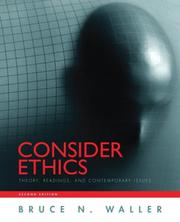| Listing 1 - 10 of 12 | << page >> |
Sort by
|
Book
ISBN: 9780262016599 0262016591 0262298074 0262298945 1283302918 9786613302915 9780262298940 9781283302913 9780262298070 6613302910 Year: 2011 Publisher: Cambridge (Mass.): MIT Press,
Abstract | Keywords | Export | Availability | Bookmark
 Loading...
Loading...Choose an application
- Reference Manager
- EndNote
- RefWorks (Direct export to RefWorks)
In Against Moral Responsibility, Bruce Waller launches a spirited attack on a system that is profoundly entrenched in our society and its institutions, deeply rooted in our emotions, and vigorously defended by philosophers from ancient times to the present. Waller argues that, despite the creative defenses of it by contemporary thinkers, moral responsibility cannot survive in our naturalistic-scientific system. The scientific understanding of human behavior and the causes that shape human character, he contends, leaves no room for moral responsibility. Waller argues that moral responsibility in all its forms—including criminal justice, distributive justice, and all claims of just deserts—is fundamentally unfair and harmful and that its abolition will be liberating and beneficial. What we really want—natural human free will, moral judgments, meaningful human relationships, creative abilities—would survive and flourish without moral responsibility. In the course of his argument, Waller examines the origins of the basic belief in moral responsibility, proposes a naturalistic understanding of free will, offers a detailed argument against moral responsibility and critiques arguments in favor of it, gives a general account of what a world without moral responsibility would look like, and examines the social and psychological aspects of abolishing moral responsibility. Waller not only mounts a vigorous, and philosophically rigorous, attack on the moral responsibility system, but also celebrates the benefits that would result from its total abolition.
General ethics --- Ethics. --- Responsibility. --- Responsibility --- Ethics --- Accountability --- Moral responsibility --- Obligation --- Deontology --- Ethics, Primitive --- Ethology --- Moral philosophy --- Morality --- Morals --- Philosophy, Moral --- Science, Moral --- Supererogation --- Philosophy --- Values --- PHILOSOPHY/General --- COGNITIVE SCIENCES/Psychology/Cognitive Psychology --- SOCIAL SCIENCES/Political Science/Public Policy & Law
Book
ISBN: 9780262028165 Year: 2015 Publisher: Cambridge, Mass. The MIT Press
Abstract | Keywords | Export | Availability | Bookmark
 Loading...
Loading...Choose an application
- Reference Manager
- EndNote
- RefWorks (Direct export to RefWorks)
Book
ISBN: 0262327406 0262327414 9780262327404 0262028166 9780262028165 132247494X 9781322474946 9780262327411 Year: 2014 Publisher: Cambridge, Massachusetts
Abstract | Keywords | Export | Availability | Bookmark
 Loading...
Loading...Choose an application
- Reference Manager
- EndNote
- RefWorks (Direct export to RefWorks)
"The philosophical commitment to moral responsibility seems unshakable. But, argues Bruce Waller, the philosophical belief in moral responsibility is much stronger than the philosophical arguments in favor of it. Philosophers have tried to make sense of moral responsibility for centuries, with mixed results. Most contemporary philosophers insist that even conclusive proof of determinism would not and should not result in doubts about moral responsibility. Many embrace compatibilist views, and propose an amazing variety of competing compatibilist arguments for saving moral responsibility. In this provocative book, Waller examines the stubborn philosophical belief in moral responsibility, surveying the philosophical arguments for it but focusing on the system that supports these arguments: powerful social and psychological factors that hold the belief in moral responsibility firmly in place. Waller argues that belief in moral responsibility is not isolated but rather is a central element of a larger belief system; doubting or rejecting moral responsibility will involve major adjustments elsewhere in a wide range of beliefs and values. Belief in moral responsibility is one strand of a complex and closely woven fabric of belief, comprising threads from biology, psychology, social institutions, criminal justice, religion, and philosophy. These dense interconnections, Waller contends, make it very difficult to challenge the belief in moral responsibility at the center. They not only influence the philosophical arguments in favor of moral responsibility but also add powerful extraphilosophical support for it"--Publisher's description.
Responsibility. --- Accountability --- Moral responsibility --- Obligation --- Ethics --- Supererogation --- PHILOSOPHY/General

ISBN: 0585092222 9780585092225 0791438198 0791438201 1438423128 9781438423128 Year: 1998 Publisher: Albany, N.Y. State University of New York Press
Abstract | Keywords | Export | Availability | Bookmark
 Loading...
Loading...Choose an application
- Reference Manager
- EndNote
- RefWorks (Direct export to RefWorks)
Autonomy (Philosophy) --- Responsibility. --- Biology --- Animal welfare. --- Ethics, Evolutionary. --- Ethics, Naturalistic --- Evolutionary ethics --- Naturalistic ethics --- Ethics --- Ethical relativism --- Abuse of animals --- Animal cruelty --- Animals --- Animals, Cruelty to --- Animals, Protection of --- Animals, Treatment of --- Cruelty to animals --- Humane treatment of animals --- Kindness to animals --- Mistreatment of animals --- Neglect of animals --- Prevention of cruelty to animals --- Protection of animals --- Treatment of animals --- Welfare, Animal --- Vitalism --- Accountability --- Moral responsibility --- Obligation --- Supererogation --- Philosophy --- Philosophy. --- Abuse of --- Social aspects --- Autonomy (Philosophy).
Book
ISBN: 1498522394 9781498522397 9781498522380 1498522386 Year: 2015 Publisher: Lanham
Abstract | Keywords | Export | Availability | Bookmark
 Loading...
Loading...Choose an application
- Reference Manager
- EndNote
- RefWorks (Direct export to RefWorks)
Restorative Free Will examines free will as an adaptive capacity that evolved in humans and many other species, and restores free will to species excluded by claims of human uniqueness. Restorative Free Will recognizes the basic biological value of both libertarian and compatibilist elements of free will, and explains how these traditionally opposed accounts of free will capture an essential element of foraging animals' free will.
Free will and determinism. --- Compatibilism --- Determinism and free will --- Determinism and indeterminism --- Free agency --- Freedom and determinism --- Freedom of the will --- Indeterminism --- Liberty of the will --- Determinism (Philosophy)
Book
ISBN: 9781138506398 1138506397 9781315146911 Year: 2017 Publisher: New York (N.Y.) : Routledge,
Abstract | Keywords | Export | Availability | Bookmark
 Loading...
Loading...Choose an application
- Reference Manager
- EndNote
- RefWorks (Direct export to RefWorks)
Criminal justice, Administration of --- Punishment --- Social justice. --- Moral and ethical aspects.
Book
ISBN: 9781793632647 Year: 2020 Publisher: Lanham (Md.) : Lexington books,
Abstract | Keywords | Export | Availability | Bookmark
 Loading...
Loading...Choose an application
- Reference Manager
- EndNote
- RefWorks (Direct export to RefWorks)
"This book examines a nonconscious and profoundly harmful desire that is almost universally denied: the desire to be a god. Afflicting believers and nonbelievers alike, the desire is manifested in religious myths and throughout the history of philosophy"--
Apotheosis. --- Free will and determinism. --- Responsibility.
Book
ISBN: 9781032257150 Year: 2022 Publisher: New York, NY : Routledge,
Abstract | Keywords | Export | Availability | Bookmark
 Loading...
Loading...Choose an application
- Reference Manager
- EndNote
- RefWorks (Direct export to RefWorks)
Focusing on why neoliberalism gained such a unique strong hold in the United States, philosopher Bruce N. Waller in this book traces the source back to the country's origins and the entwined core values of the nation's Founding Fathers. Their extreme commitment to private property rights (as evinced in a unanimous vote for the Constitution's Fugitive Slave Clause), an aversion to widespread democracy, and a deep belief in the uniquely just nature of their new country together created the ideal conditions for neoliberalism's growth and success. Waller also provides a clear analysis of the moral and psychological conditions so hospitable to neoliberalism, including the compatibility of a faith in the "invisible hand" of the free market with the widespread belief - which remains prevalent in the United States - that the world is just and people generally get what they deserve. Waller examines how the ideal of moral responsibility in the United States provides the core belief that holds in place the basic principles of American neoliberalism. The book ends by shedding light on the deleterious effects of neoliberalism and shows that its replacement requires not only the amelioration of enormous inequity in wealth, but also the opportunity for all citizens to exercise autonomy, control, and critical thought in their lives and workplaces. Key Features Traces neoliberal values deep into American history and culture Uses empirical psychological research to explain the broad appeal of neoliberalism Describes the strong interconnected neoliberal value system of belief in a just world, personal responsibility, and radical individualism, and their combined influence on American culture Examines the influence of neoliberal values on the American criminal justice and educational systems.
Neoliberalism --- Neoliberalism. --- History --- United States.

ISBN: 9780205539369 020553936X Year: 2008 Publisher: New York: Pearson Longman,
Abstract | Keywords | Export | Availability | Bookmark
 Loading...
Loading...Choose an application
- Reference Manager
- EndNote
- RefWorks (Direct export to RefWorks)
Book
ISBN: 0131941100 Year: 1988 Publisher: Englewood Cliffs (N.J.): Prentice Hall
Abstract | Keywords | Export | Availability | Bookmark
 Loading...
Loading...Choose an application
- Reference Manager
- EndNote
- RefWorks (Direct export to RefWorks)
Critical thinking --- Logic --- Verdicts
| Listing 1 - 10 of 12 | << page >> |
Sort by
|

 Search
Search Feedback
Feedback About UniCat
About UniCat  Help
Help News
News